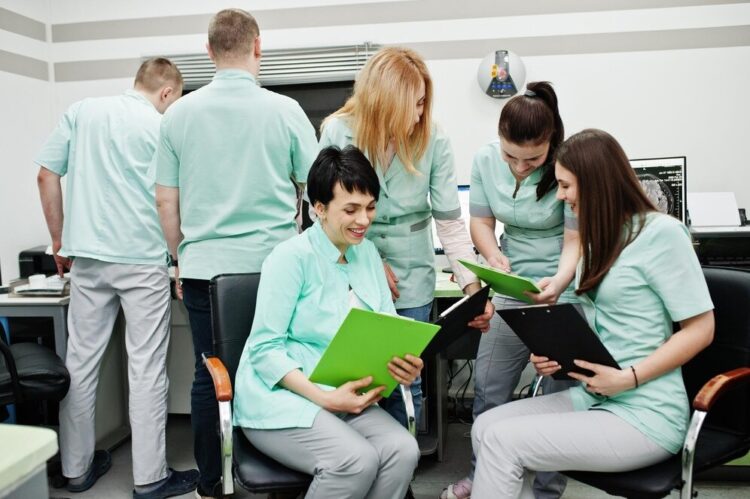Houston stands as a titan in the healthcare sector, home to the renowned Texas Medical Center, the largest medical complex in the world. With a robust infrastructure that supports a diverse range of healthcare services, from cutting-edge research initiatives to community health clinics, Houston is a thriving hub for medical professionals.
As a prospective medical assistant, you’re poised to tap into this immense network. The city hosts over 60 hospitals and numerous specialty care facilities, providing an abundance of employment opportunities for medical assistants with varied interests.
The educational institutions in the area also reflect a commitment to cultivating talent tailored specifically to the local healthcare ecosystem, integrating both academic rigor and practical application.
Moreover, Houston’s cost of living, being lower than many major cities, allows students to pursue their education without a prohibitive financial burden, thus enhancing their ability to focus on their studies and professional development.
Page Contents
Networking Opportunities: Connecting with Industry Leaders
Networking plays an essential role in advancing one’s career, especially in the medical field, where connections can lead to job opportunities, mentorship, and collaborative projects. Houston offers a vibrant professional community with numerous healthcare conferences, seminars, and local workshops that attract industry leaders.
These events provide a platform for medical assistants to engage with experienced practitioners, educators, and potential employers.
Additionally, many of Houston’s educational institutions have established partnerships with local healthcare facilities, allowing students to participate in internships and externships that not only enrich their learning experience but also expand their professional networks.
The presence of organizations such as the Houston Area Healthcare Coalition further amplifies opportunities for networking, providing medical assistants with access to an extensive array of resources, job listings, and professional development workshops.

Source: freepik.com
Diverse Patient Populations: Expanding Your Skill Set
One of the most compelling advantages of studying and working in Houston is the city’s rich tapestry of cultures and diverse patient populations. As the fourth largest city in the United States, Houston boasts a melting pot of residents from countless backgrounds, including international communities that speak a multitude of languages.
This diversity brings unique healthcare challenges and enriches the educational experience for medical assistants-in-training. Exposure to varied social determinants of health enables students to develop cultural competence, learn to communicate effectively with diverse patients, and adapt care strategies to meet the individual needs of their clientele.
Furthermore, working with diverse populations enhances interview, assessment, and treatment planning skills, essential attributes that can propel a medical assistant’s career. As healthcare increasingly recognizes the importance of culturally sensitive care, this experience positions graduates favorably in the job market.
Unpacking the Medical Assistant Curriculum: What to Expect
Core Courses: Foundations of Patient Care and Administration
The curriculum of medical assistant programs in Houston is structured to provide a solid foundation in both clinical and administrative expertise. Core courses typically encompass subjects such as human anatomy and physiology, pharmacology, patient care techniques, and medical billing and coding.
Understanding the human body and its functions is essential for providing effective patient care, as it impacts everything from vital sign monitoring to medication administration.
Training in medical billing and coding prepares students to handle insurance claims efficiently, an increasingly vital component in today’s healthcare environment.
Students also receive training in fundamental medical procedures such as EKGs, phlebotomy, and administering injections, ensuring they are well-rounded and prepared for the clinical demands they will face.
This interdisciplinary approach equips them with the knowledge and skills necessary to contribute to a healthcare team effectively, making them indispensable assets in any clinical setting.
Hands-On Training: Simulated Labs and Real-World Experience
Education at Houston medical assistant school is not just about theoretical knowledge; it heavily emphasizes hands-on training as well. Many programs incorporate simulated labs, where students practice clinical procedures in controlled environments using the latest medical technology and equipment.
These labs help foster a safe learning environment where students can make mistakes, learn from them, and build confidence in their skills before entering real-world scenarios. Further augmenting this experiential learning are clinical rotations or externships, where students have the opportunity to work alongside healthcare providers in actual settings.
This practical experience allows them to apply their classroom learning to real patients and situations, reinforcing their clinical reasoning and decision-making abilities.
These experiences are invaluable not only for skill development but also for building a professional portfolio, showcasing their competencies to potential employers.
Certification Prep: Your Gateway to Credentialing Success
Pursuing certification as a medical assistant is often a pivotal step in enhancing employability and career advancement. Houston medical assistant programs typically have built-in exam preparation components for certifications offered by esteemed organizations, such as the American Association of Medical Assistants (AAMA) or the National Healthcareer Association (NHA).
These preparations include comprehensive reviews of exam content, practice tests, and tips on test-taking strategies. Achieving certification can significantly bolster a medical assistant’s credibility, opening doors to more advanced roles within the healthcare system.
Furthermore, certification can lead to higher wages and increased job security, making it an essential aspect of the educational journey for aspiring medical assistants. Local schools also frequently feature resources such as study groups or review classes, providing additional support leading up to certification examinations.
Career Pathways: Where a Medical Assistant Degree Can Take You

Source: freepik.com
Exploring Specializations: From Pediatrics to Geriatrics
One of the advantages of earning a degree as a medical assistant is the vast range of career opportunities available, allowing you to explore various specializations. As medical technology and healthcare needs continue to evolve, so too does the demand for specialty areas such as pediatrics, geriatrics, obstetrics, and more.
For instance, working in pediatrics allows you to interact closely with children and their families, requiring both specialized skills in child health and an acute sense of patience and empathy.
Similarly, a role in geriatrics involves caring for elderly patients, who often have chronic conditions needing complex management. Specialization in these areas often results in more fulfilling work experiences and can lead to greater job satisfaction.
In addition, many medical assistants find that certain specialties offer more lucrative salaries, encouraging career growth and advancement.
Advancement Opportunities: Climbing the Healthcare Ladder
The pathway to career advancement is another compelling reason to consider becoming a medical assistant in Houston. With experience, technicians often find opportunities to move into supervisory or managerial roles, such as office manager, lead medical assistant, or healthcare administrator.
Additionally, some medical assistants choose to further their education and become registered nurses, nurse practitioners, or physician assistants, significantly increasing their earning potential and influence within the healthcare setting.
The burgeoning healthcare landscape in Houston fosters continual growth and innovation, presenting ample opportunities for professionals willing to invest in ongoing education and training.
Institutions often offer resources for career advancement, including workshops, mentorship programs, and partnerships with universities that facilitate the transition into more advanced healthcare roles.
Real Stories: Successful Graduates and Their Journeys
Inspiring stories are abundant among graduates of Houston medical assistant programs, showcasing the diverse paths one can take. One notable graduate, Maria, began her journey as a medical assistant in a bustling family practice, quickly realizing her passion for patient education and health promotion.
Maria leveraged her experience and pursued further education, ultimately becoming a registered nurse specializing in community health initiatives aimed at improving access to care for underserved populations.
Conversely, Jake, another graduate, found fulfillment in specializing in surgical assistance, enabling him to work in dynamic surgical settings, and he now actively contributes to training future medical assistants.
These stories illustrate the potential flexibility and varied careers available to professionals who start as medical assistants, underscoring the importance of education, hands-on experience, and unwavering dedication within the healthcare industry.
Beyond the Classroom: The Essential Skills for Medical Assistants

Source: freepik.com
Soft Skills Matter: Building Empathy and Communication
While technical skills are essential for medical assistants, the importance of soft skills cannot be overstated. Empathy, compassion, and effective communication are the bedrock of patient-centered care.
As healthcare environments can often be high-stakes and emotionally charged, medical assistants need to navigate these situations with grace and professionalism. Building strong relationships with patients fosters trust, ultimately leading to better patient outcomes and satisfaction.
A significant component of this is developing active listening skills; providing patients with space to express their concerns while validating their feelings contributes to a more therapeutic and effective healthcare experience.
Moreover, medical assistants often serve as the crucial link between patients and other healthcare providers, necessitating clear communication to ensure that patients feel understood and properly informed about their care plans.
In today’s increasingly digital healthcare landscape, technological proficiency is a vital skill for medical assistants. Familiarity with Electronic Health Records (EHR) systems, telemedicine platforms, and practice management software is essential for seamless patient care and organization within healthcare facilities.
Programs in Houston often incorporate training on various EHR systems, ensuring students graduate with the skills necessary to navigate these tools efficiently. Additionally, understanding data entry, patient confidentiality laws, and information security practices are crucial components of this training.
As more healthcare providers transition to digital records, medical assistants who are adept at technology will find themselves at a distinct advantage, making them more marketable to potential employers.
Staying Current: Lifelong Learning in the Medical Field
The healthcare field is perpetually evolving, driven by advancements in medical technology, treatment protocols, and regulatory changes. Consequently, medical assistants must commit to lifelong learning to remain relevant and effective practitioners.
Enrolling in continuing education courses, attending workshops, and pursuing additional certifications are essential steps for career development.
Additionally, professional organizations often provide resources, networking events, and newsletters that keep members updated on industry trends and best practices.
By embracing a mindset of lifelong learning, medical assistants position themselves as knowledgeable, skilled workers ready to tackle new challenges as they arise, ultimately enhancing their career trajectories in the dynamic healthcare landscape.




